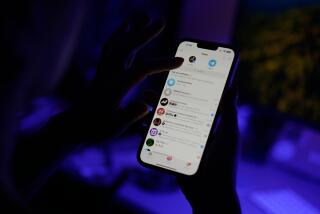Ex-UC Student Indicted in Cyberspace Hate Crime Case
- Share via
In the first hate crime prosecution of its kind, a former UC Irvine student was indicted Wednesday on 10 counts of civil rights violations for allegedly sending an anonymous computer message threatening to “hunt . . . down and kill” Asians on campus.
Federal prosecutors said the grand jury indictment of 19-year-old Richard Machado of Irvine marks the first government prosecution of a federal hate crime allegedly committed in cyberspace.
The indictment is almost certain to roil the ongoing debate over an increasingly troubling question: Should speech on a computer network be subject to the same legal standards as speech in any other medium?
The grand jury charged that Machado crossed the line when he sent a threatening electronic message to about 60 UC Irvine students on Sept. 20. In the e-mail, the indictment said, Machado accused Asians of being responsible for all crimes on campus, ordered them to leave the university and warned that he would personally kill them if they didn’t.
Last year, 47% of UC Irvine’s estimated 16,700 students were Asian American, the largest percentage of any UC school.
“This was no prank,” said U.S. Atty. Nora M. Manella. “The defendant’s clear intent was to scare and intimidate Asian students and to discourage them from attending the university to which they were lawfully admitted. Such conduct is criminal.”
Machado, a Latino, was not an enrolled student when he used a 24-hour computer lab in the university’s engineering building, campus police said.
If convicted, Machado faces up to 10 years in prison and a maximum $1-million fine, said Assistant U.S. Atty. Michael Gennaco, who will prosecute the case.
Gennaco said most of the recipients of the hate-filled e-mail were Asian Americans, including the suspect’s former roommate.
The message, which contained less than a dozen sentences and was signed “Asian-hater,” sparked outrage at the quiet campus. The incident angered the local community and was heavily covered by media in countries as far as Korea and China.
Truong Quang Pham, a 22-year-old computer science senior who was named as a victim in the federal indictment, said he was pleased that prosecutors had filed charges against Machado. “When I first saw the message, I thought it was a joke,” Pham said. “But when I heard other people received it, I said this guy was serious. It’s a mean thing.”
During their investigation, campus police said, they discovered that the suspect had delivered a death threat to the school newspaper staff last year, warning that they were “all going to die.”
Machado has talked voluntarily to campus police and FBI investigators about the messages, but Gennaco said he could not disclose what the defendant said.
The indictment against Machado is among only a few prosecutions involving alleged cyberspace crimes. College campuses have been at the center of a debate involving censorship of their computer networks.
*
Earlier this year, Sacramento prosecutors charged Jose Saavedra, a 19-year-old freshman at the University of Texas at El Paso, with making a terrorist threat in a computer message against California state Sen. Tim Leslie (R-Carnelian Bay).
The computer message, posted to several environmental and political Internet discussion groups, alluded to Leslie’s support for a ballot measure that would have removed special protections for mountain lions in California. It read in part: “Let’s hunt Sen. Tim Leslie for sport. . . . I think it would be great if he were hunted and skinned and mounted for our viewing pleasure.”
Misdemeanor charges against Saavedra are pending in Sacramento.
In another closely watched case last year, a University of Michigan student who sent graphic e-mail messages about torturing young women was charged with transmitting a threat over state lines by electronic mail. That case was dismissed.
Ronald Talmo, a constitutional law professor at Western University School of Law in Fullerton, said the indictment will trigger debate about whether taxpayers’ money should be spent to prosecute words.
Talmo and other civil libertarians have argued that any evaluation of a threat needs to take the nature of the medium into account--especially in cyberspace, where talk is cheap, context is fleeting, and “flame wars” are routine.
“I would prefer that these crimes not be prosecutable,” Talmo said. “They are just words on a screen. Those who sign on to” a computer network accept the risks of encountering such speech.
But Gennaco said courts have consistently ruled that threats to injure someone are not protected by the 1st Amendment.
Gennaco said UC Irvine students enjoyed a federal right to attend a public school and to be free from intimidation.
“We recognize that there are 1st Amendment protections for individuals,” Gennaco said. “But this is clearly a case where someone threatened to do bodily harm to a targeted group. We don’t feel there is any protection for that.”
More to Read
Sign up for Essential California
The most important California stories and recommendations in your inbox every morning.
You may occasionally receive promotional content from the Los Angeles Times.










